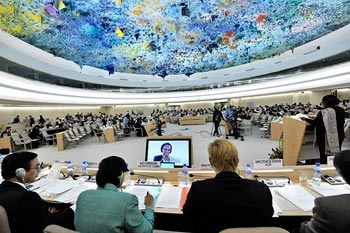IS SOUTH AFRICA PLANNING TO VOTE AGAINST LGBTI RIGHTS AT THE UN?

The United Nations Human Rights Council in Geneva
There are concerns that South Africa will not vote in favour of a new UN resolution against LGBTI discrimination and violence.
The country has in the past been accused of inconsistency and of flip-flopping on the issue of international LGBTI equality, especially when it comes to other African countries.
After a miserable record in that arena, it was instrumental in tabling a ground-breaking 2011 resolution at the UN Human Rights Council (UNHRC) condemning discrimination and violence based on sexual orientation and gender identity.
However, South Africa has since failed to live up to its commitment to host a regional summit on LGBTI issues in Africa; a requirement that resulted from that resolution.
A follow up resolution sponsored by Brazil, Uruguay, Colombia and Chile is expected to be tabled at the UNHRC in Geneva as soon as today.
Chile’s Ambassador, Marta Maurás, wrote on Thursday that in the three years since the 2011 resolution, the situation for LGBTI people has gotten worse in many places around the world.
“The urgency to ensure their protection remains ever so crucial,” she said. “It is with this sense of urgency that Brazil, Chile, Colombia and Uruguay have introduced a draft resolution this session to follow-up on efforts made since 2011.”
Maurás went on to say: “The violence and discrimination faced by LGBTI people is a global phenomenon that requires a global response. Yet the Human Rights Council is divided on this issue.”
The new draft resolution calls for a report by the UN High Commissioner for Human Rights every two years, so that the council can periodically and incrementally build its understanding on how to address the issue.
“Those many victims of brutal attacks, of exclusion and of stigma deserve our sustained attention. It is not a matter of creating new categories of human rights. Nothing can justify such violations, and none of us can ignore our obligation to prevent and address such violations, no matter what our cultural, traditional or religious values might be,” said Maurás.
Disturbingly, Mambaonline has received reports that South Africa has refused to be part of the group sponsoring the resolution and, as of this morning, remains undecided on whether it will support it or not.
“Are we comfortable with our public representatives failing to act in accordance with our bill of rights?” asked South African LGBTI activist Steve Letsike on Facebook. “Are we comfortable with South Africa, given our history, failing to act on all forms of discrimination and violence?”
Last month, the South African government insisted that it was still committed to hosting the long-delayed LGBTI regional summit, which it originally promised to hold in the early part of this year. It has not explained the delay nor has it been prepared to set a date for the event.
While LGBTI summits have been hosted around the world, Africa remains the only region in which one has not taken place. There are concerns that the country is pandering to its African allies, many of whom do not support LGBTI equality.
Last week, the International Service for Human Rights (ISHR) released a compilation of around 50 cases of violence, discrimination and other violations against people on the grounds of sexual orientation or gender identity from around the world. The cases were based on reports sourced by the UNHRC itself.
“The UN can’t ignore the cases of human rights violations against LGBTI people that have been compiled by its own independent experts,” said Pooja Patel of ISHR.
“A look backwards over the three years since the UN Human Rights Council adopted the first-ever UN resolution on human rights, sexual orientation and gender identity in 2011 shows that the violence and discrimination against LGBTI individuals and groups continue, are widespread and are systematic,” Patel said.
- Facebook Messenger
- Total103
Leave a Reply